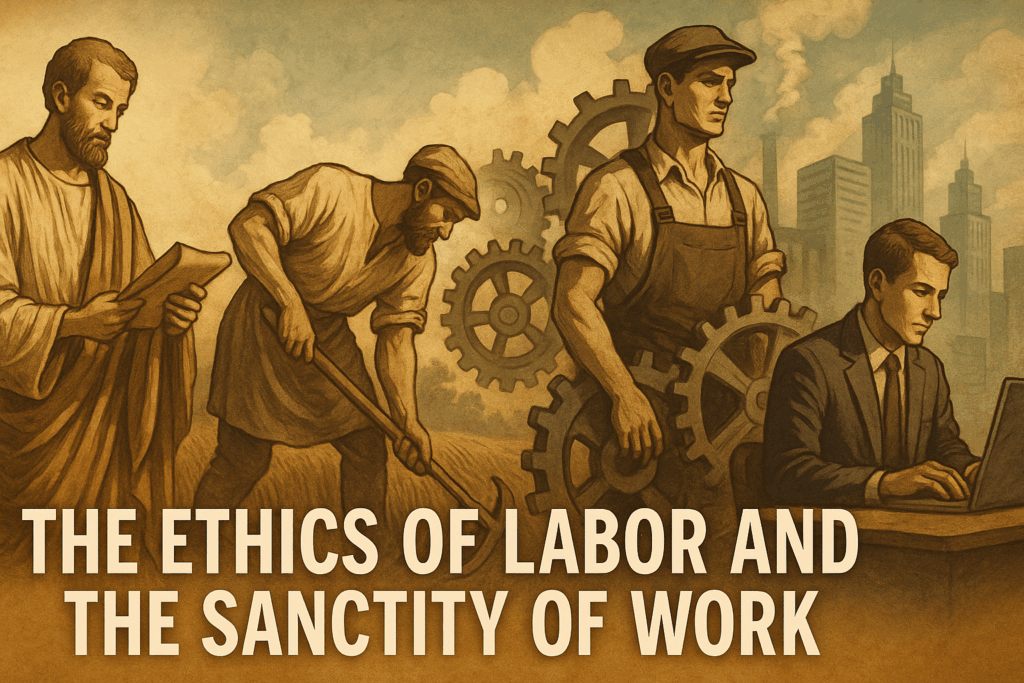For Paul, work was not merely a necessity of survival or a mark of social class—it was sanctified as service to the Lord. In his letters, Paul repeatedly emphasized the dignity of labor and condemned idleness, urging believers to see their daily tasks as offerings to God. This paradigm dignified ordinary work, elevated the role of vocation, and provided the foundation for the modern ethic of labor as meaningful, valuable, and tied to human flourishing. By sanctifying work, Paul gave Western civilization one of its most enduring moral commitments: that labor is honorable and that every worker has dignity.

The Scriptural Witness
Paul is direct in 2 Thessalonians 3:10–12: “For even when we were with you, this we commanded you, that if any would not work, neither should he eat. For we hear that there are some which walk among you disorderly, working not at all, but are busybodies. Now them that are such we command and exhort by our Lord Jesus Christ, that with quietness they work, and eat their own bread.” Here Paul rejects idleness as contrary to Christian life. Work is not merely economic but moral, grounding dignity in self-sufficiency and quiet responsibility. In contrast to the exploitative leisure of the elite in Greco-Roman society, Paul affirms the value of labor for all believers.
In Colossians 3:23–24, Paul elevates work to an act of worship: “And whatsoever ye do, do it heartily, as to the Lord, and not unto men; knowing that of the Lord ye shall receive the reward of the inheritance: for ye serve the Lord Christ.” Ordinary labor is transformed into service to Christ himself. No task is too humble, no duty too menial, when performed in faith. By rooting work in the Lord rather than in earthly masters, Paul grants intrinsic dignity to all forms of labor. This vision radically undercuts class-based scorn for manual or menial work and lays the foundation for a culture that honors work itself as sacred.
The Pauline Paradigm and Modern Ethics
Paul’s ethic of labor overturned ancient assumptions about work and dignity. In Greco-Roman society, physical labor was often despised, relegated to slaves and the poor, while leisure and politics were considered the pursuits of the elite. Paul subverted this hierarchy by sanctifying work for all. His teaching democratized dignity, insisting that every form of labor—whether humble or exalted—is honorable when done unto the Lord.
This principle profoundly shaped later Christian thought. Monastic traditions emphasized the motto ora et labora—prayer and work—fusing devotion with labor. The Protestant Reformation further expanded this vision into the doctrine of vocation, affirming that every honest occupation is a calling from God. The modern “work ethic,” with its emphasis on diligence, discipline, and integrity, draws directly from Paul’s paradigm.
Beyond religious life, the Pauline ethic has shaped secular values of labor and vocation. The idea that all work deserves dignity informs modern labor rights, fair wages, and protections for workers. The rejection of idleness and affirmation of responsibility continues to influence social welfare debates, balancing compassion with the expectation of contribution. Paul’s paradigm thus resonates not only in churches but in the policies and practices of modern economies.
Why It Matters Today
In an age of economic inequality, exploitation, and questions about the meaning of work, Paul’s paradigm offers a needed corrective. His vision insists that labor is not a curse but a calling, not drudgery but dignity. Work connects human beings to God, to one another, and to their own flourishing. To forget this is to risk reducing labor to a mere commodity, stripping it of its sacred worth and reducing workers to tools of profit.
Modern secular ethics—whether in labor rights movements, workplace dignity initiatives, or the pursuit of meaningful vocation—are indebted to Paul’s teaching. The conviction that every worker deserves respect, that no labor is beneath human dignity, and that responsibility belongs to all, flows directly from the Pauline sanctification of work.
Paul’s ethic of labor transformed the world by elevating the ordinary into the sacred. It remains the foundation for a civilization that honors work and insists that in every task, done faithfully, we serve not men but the Lord Christ.
